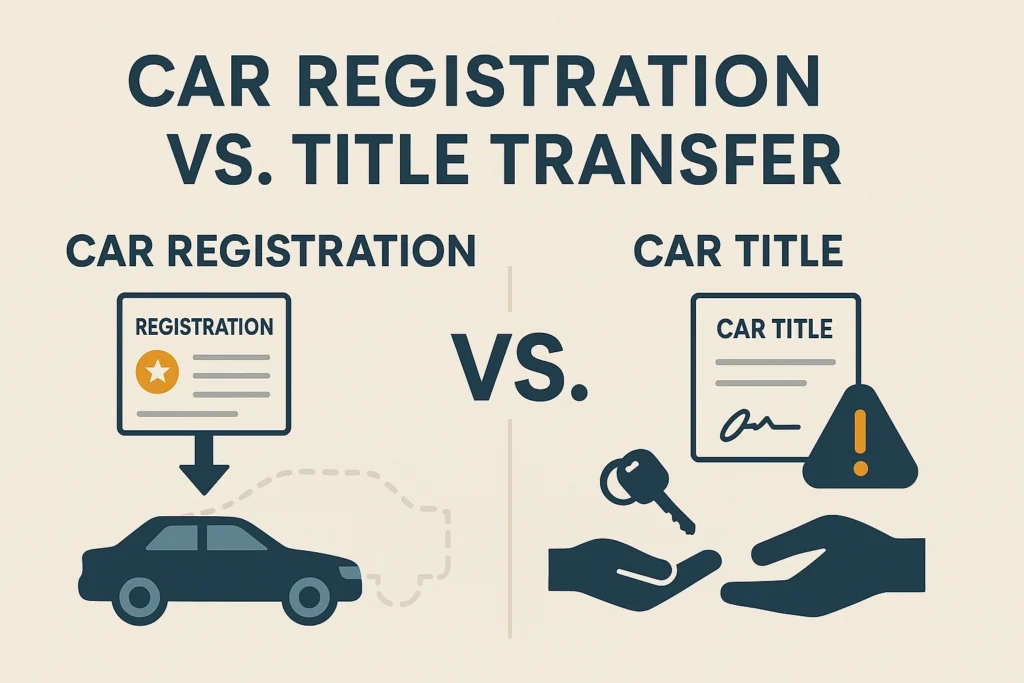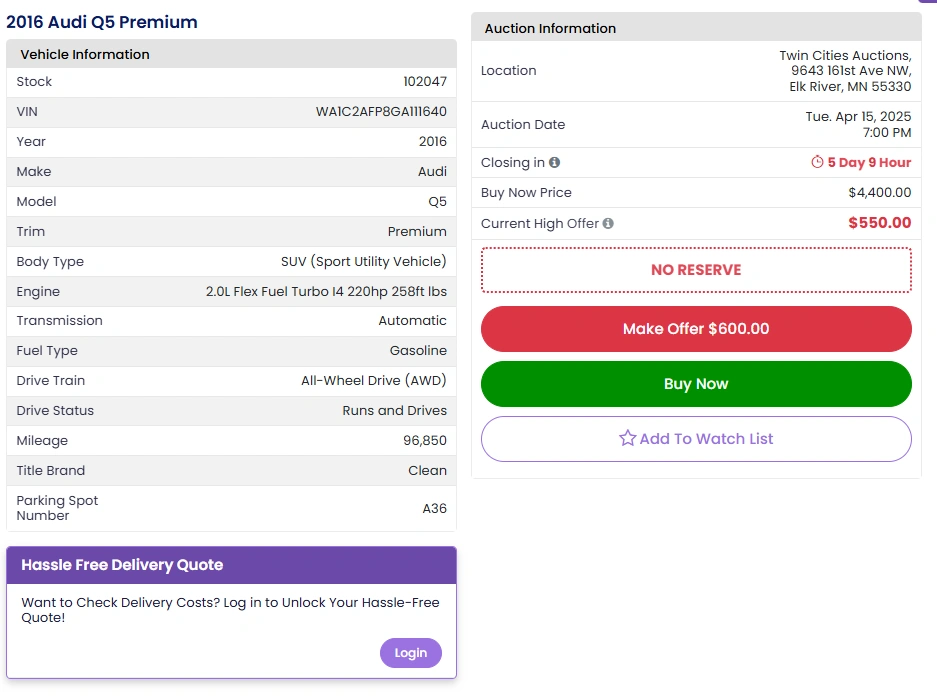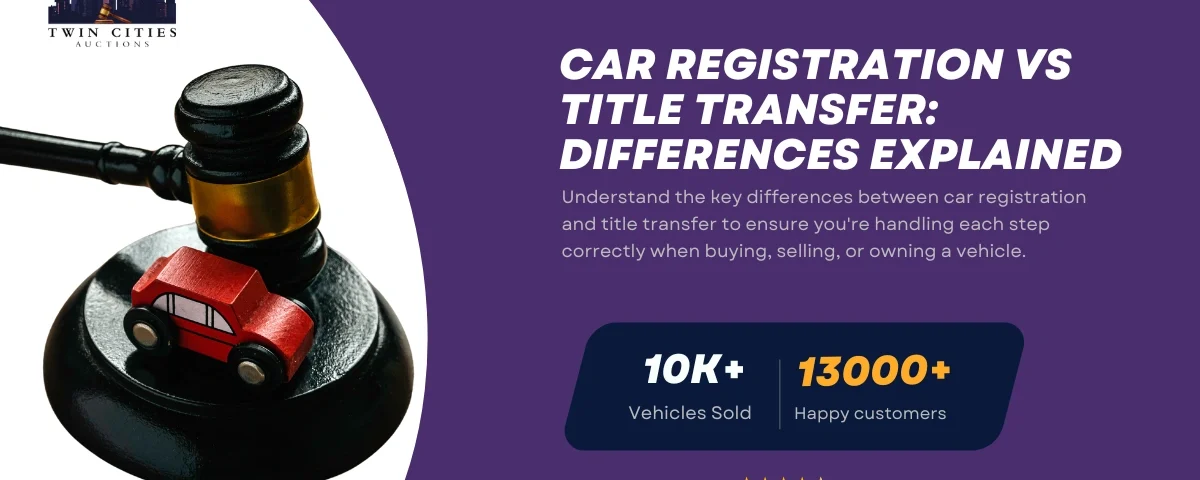Did you know that across the U.S., motor vehicle agencies reject over 200,000 paperwork submissions each year because drivers confuse registration with title transfers?
A simple mix-up can land you fines, impoundment, or gaps in insurance coverage. Whether you’re buying a new ride, selling your classic, or relocating across state lines, mastering these two distinct processes protects your investment and keeps you street-legal.

Key Takeaways
- Registration grants legal permission to drive a vehicle, requiring proof of insurance, inspections, and fee payment.
- Title Transfer officially records a change in ownership, involving signed titles, odometer disclosures, bills of sale, and lien releases.
- Confusing the two can result in penalties, invalidated insurance, or delays in using your vehicle.
- Bundling tasks, using checklists, and storing digital copies streamline the DMV experience.
- Auctions like Twin Cities Auctions supply cars with clear titles and registration-ready paperwork from day one.
What Is Vehicle Registration (and Why It’s Essential)
Vehicle registration links your car to you in the state’s database and authorizes you to drive on public roads. It typically requires:
- Proof of Insurance meeting your state’s minimum liability requirements
- Safety/Emissions Inspection where mandated by local regulations
- Payment of Registration Fees, which range from $50 to $200 annually depending on state and vehicle type
- License Plates and Renewal Stickers indicating your valid registration period.
Renew your registration promptly—states often impose monthly late fees or may even suspend your plates if you delay renewal.
Why Title Transfer Is More Than Paperwork
A title transfer legally records a change in vehicle ownership with the state’s motor vehicle department. Key steps include:
- Signing the Title by both seller and buyer
- Odometer Disclosure for cars under ten years old
- Bill of Sale documenting sale price and date
- Lien Release if the vehicle was financed
- Submitting the Title Application and paying the title-transfer fee (typically $10–$50)
Prompt title transfer—usually within 30 days of sale—avoids late-transfer penalties.
When to Handle Registration vs. Title Transfer
- New Car from Dealer: Dealers often file both title and registration in one trip.
- Private-Party Purchase: You transfer the title first, then register the vehicle.
- Gifts and Inheritances: Title transfers require gift affidavits; registration follows.
- Moving to a New State: Most states give 30–60 days to retitle and register your car.
- Business Fleet Changes: Follow similar steps with potential additional commercial documentation.
Nail Your Title Transfer in Four Simple Moves
- Gather All Paperwork: Signed title, odometer disclosure, bill of sale, lien release if applicable.
- Notarize When Required: Some states mandate notarization for out-of-state or gift transfers.
- Submit to the DMV: Pay the title-transfer fee and get a receipt.
- Wait for Your New Title: Processing ranges from same-day issuance to several weeks, depending on your state.
| Document | Why It Matters |
| Signed Title | Establishes legal handoff between parties |
| Odometer Disclosure | Confirms mileage accuracy on younger vehicles |
| Bill of Sale | Records transaction details for DMV and taxes |
| Lien Release | Clears lender claims before transferring |
| Transfer Fee | Covers administrative handling |
Lock Down Your License Plates in Five Clear Steps
- Show Proof of Insurance: Current policy documents meeting minimum coverage.
- Pass Required Inspections: Safety and/or emissions certificates if your state requires them.
- Select Your Plates: Standard, specialty, or personalized options.
- Pay Registration Fees: Varies by vehicle weight, type, and region.
- Display Plates and Stickers: Affix as instructed by your DMV to avoid tickets.
| Requirement | Typical Detail |
| Insurance Card | Shows state-mandated coverage |
| Inspection Cert. | Valid safety/emissions report |
| Fee Payment | $50–$200 annually |
| Plates & Sticker | Valid through renewal date |
Dodge These Common DMV Mistakes
| Mistakes | Title Transfer Remedy | Registration Remedy |
| Missing Signatures | Re-sign with exact spelling | N/A |
| VIN Typo | Copy directly from dashplate | Match entry to title |
| Skipped Odometer Disclosure | Complete the required disclosure | N/A |
| Lapsed Insurance | N/A | Renew policy before registration |
| Late Filing | Pay the title late penalty | Pay registration late fees |
Why It All Matters
Confusing registration with title transfer can have real consequences:
- Fines & Impoundment: States can fine up to $500 and tow unregistered or untitled vehicles
- Invalid Insurance: Coverage may be void if the vehicle isn’t properly registered.
- Resale Roadblocks: Buyers want clean titles and current registrations for financing.
Best Practices and Tips
- Combine DMV Appointments: Handle title and registration in a single visit to save time.
- Use a Detailed Checklist: Print a list that covers every required document and form.
- Set Reminder Alerts: Schedule notifications for registration renewals and title transfer deadlines.
- Store Digital Copies: Keep scanned documents on your phone or in the cloud for on-the-spot reference.
- Hire an Authorized Agent: If you’re short on time, many states allow third-party services to file paperwork on your behalf.
- Double-Check Before Submission: One typo can derail the entire process—review every field carefully.
Why Auctions Are a Smart Choice for Car Purchases
Auctions can be an excellent source for late-model vehicles with clear chains of title and affordable pricing. Twin Cities Auctions, based in Minnesota, is one such reputable auction house that offers a wide range of vehicles at competitive prices.
Key Benefits of Buying from Auctions:
- Wide Selection: Auctions like Twin Cities Auctions offer a variety of vehicles, from low-budget cars to high-end models.

- Competitive Pricing: Auctions often offer vehicles at prices below retail value, enabling dealers to maximize their profit margins.

- Transparency: Auctions provide full vehicle history reports, so you know exactly what you’re buying.

- Convenient Bidding: Many auctions offer online bidding for your convenience, making it easier to source vehicles without being physically present.
Twin Cities Auctions: A Smart Vehicle Sourcing Choice
For those in the automotive industry, Twin Cities Auctions offers an excellent platform for sourcing quality vehicles at competitive prices.
Whether you are just starting or expanding your business, this auction house provides transparency, competitive pricing, and a broad selection.
| Feature | Description |
| Inventory Variety | Wide range of cars, trucks, and SUVs available |
| Competitive Pricing | Below-market pricing allows for higher profit margins |
| Vehicle History Reports | Detailed history reports for every vehicle |
| Online Bidding | Convenient online bidding options for dealers |
| Financing Options | Financing available to help with inventory purchases |
win Cities Auctions set you up for a smooth post-purchase experience, reducing surprises at the DMV.
Conclusion
Mistaking registration for title transfer—or vice versa—can quickly turn a routine vehicle transaction into a costly ordeal. Registration ensures you are legally allowed to drive, while title transfer confirms your ownership.
By following step-by-step procedures, leveraging checklists, combining DMV tasks, and sourcing cars with clean paperwork from auctions like Twin Cities Auctions, you’ll avoid common errors and stay compliant.
These best practices save time, prevent penalties, and give you confidence that your vehicle is both properly titled and registered.
Ready to Buy or Sell Your Car? No Dealer License Needed!
At Twin Cities Auctions, we simplify the process of buying and selling vehicles, making it straightforward and hassle-free. You don’t need a dealer license to participate—our online platform is open to the public, accommodating both first-time buyers and seasoned sellers.
Whether you’re upgrading your ride or selling your current vehicle, we provide the platform you need that offers a diverse range of vehicles and a transparent bidding process. Start your auction journey with us today!
Looking for more options? Explore our comprehensive list of all available car auctions across the United States. Your next deal might be just a click away!
FAQ
Can I register a car before transferring the title?
Most states require proof of ownership via title transfer before registration.
How long do I have to register after moving?
Typically 30–60 days; check your new state’s DMV website for exact deadlines.
Are notaries always required for title transfers?
Not always; requirements vary by state and transfer type.
What’s the penalty for late registration?
Late fees often accrue monthly, sometimes up to 25% of the renewal fee.
Do I need insurance to transfer the title?
Insurance is required for registration, not always for title transfer—verify your state’s rules.
How can I avoid VIN errors?
Compare the VIN on the dashplate, door jamb, and title before submitting forms.
Can a third party handle my DMV paperwork?
Many states allow authorized agents to file title and registration documents on your behalf.
Why choose auction-sourced cars?
Auctions like Twin Cities Auctions provide vehicles with clear titles and registration-ready documentation, minimizing DMV hassles.
Source Links
https://www.progressive.com/answers/car-title-vs-registration/
https://www.wheelsforwishes.org/news/car-title-vs-car-registration-know-the-difference/
https://www.dmv.org/vehicle-registration.php
https://www.dmv.org/title-transfer.php
https://bluenotary.us/title-transfer-vs-registration
https://www.investopedia.com/what-is-a-car-title-and-why-is-it-important-5187209


